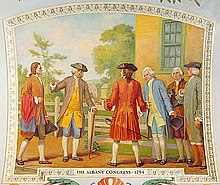Albany Congress
The Albany Congress of 1754 was an assembly of representatives of the British colonies in North America and the Iroquois League in the city of Albany, New York .

It is the second image in a series of depictions of events of importance to American constitutional history, namely the Mayflower Compact (1620), the first continental congress (1774), the declaration of independence (1776), the constitutional convention (1787), the first federal congress (1789) as well as the inauguration and the farewell address of the first president George Washington (1789 and 1796).
The congress was preceded by the termination of the Iroquois-British alliance (the so-called Covenant Chain ), which had existed since the late 17th century, by Hendrick , a chief of the Iroquois Mohawk . The Iroquois had always been the most important ally of the British in the previous " French and Indian Wars ". In 1754 the outbreak of another war against France (the Seven Years' War ) became apparent , so that the news of the breach of the Iroquois Confederation in Great Britain was received with great concern. The Board of Trade immediately instructed the governor of New York to convene a diplomatic conference on the one hand to restore the alliance with the Iroquois and on the other hand, representatives of the British colonies from South Carolina to New Hampshire to reach an agreement for better cooperation between the colonies should find. These two issues were negotiated separately from each other, so that in the literature a distinction is sometimes made between the Albany Conference (negotiations with the Indians) and the Albany Congress (negotiations between the colonies).
The participants met daily between June 19 and July 11. The alliance with the Iroquois was restored after concessions by the British. The plan for closer political cooperation between the colonies, however, turned out to be difficult. Virginia, the largest of the British colonies, boycotted Congress, and North, South Carolina and New Jersey did not send participants. A draft of a political union of the colonies, prepared by Benjamin Franklin in the lead, was approved by the delegates who had traveled, but ultimately not ratified by a single colony. In addition, the congress was characterized by intrigues among the colonies, which revolved particularly around territorial disputes.
In American historiography, the Albany Congress is generally regarded as the forerunner of the Union of the United States that was actually completed later with the American Revolution . For example, parts of Franklin's draft union were used to draft the articles of confederation that made up the United States' constitution from 1781 to 1789. In more recent representations, however, this view is criticized as a misrepresentation of history , since the circumstances and consequences of the congress revealed precisely the inability of the colonies to cooperate. As a consequence of the disastrous diplomacy, the British government released the colonies from the power to negotiate with the Indians and now concentrated these tasks in the hands of two royal superintendents.
literature
- Lawrence Henry Gipson : The British Empire before the American Revolution. Volume V: Zones of International Friction: The Great Lakes Frontier, Canada, the West Indies, India, 1748–1754 . Alfred A. Knopf, New York 1942.
- Francis Jennings : Empire of Fortune: Crowns, Colonies, and Tribes in the Seven Years War in America . WW Norton, New York and London 1988, ISBN 0393025373
- Robert C. Newbold: The Albany Congress and the Plan of Union of 1754 . Vantage Press of New York, 1955.
- Timothy J. Shannon : Crossroads of Empire; Indians, Colonists, and the Albany Congress of 1754 . Cornell University Press, Ithaca 2000, ISBN 0801436575